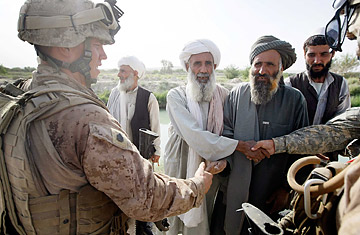
U.S. Marines from the 2nd Marine Expeditionary Brigade, RCT 2nd Battalion 8th Marines Echo Co., meet with Afghan villagers after driving Taliban fighters from the center of the village in Mian Poshteh, Afghanistan, on July 5, 2009
Pakistan is not betting on a U.S. victory in Afghanistan, nor is it going out of its way to help achieve one. Instead, say analysts and former top officials in Islamabad, Pakistan views the conflict in Afghanistan through the lens of its own national interests and its conflict with India — and it will act accordingly, prioritizing securing its own interests in Afghanistan's future. And that could be bad news for a U.S.-led military campaign that depends on Pakistan's help for thwarting the Afghan insurgency.
Pakistan officials expressed anxiety two weeks ago when 4,000 U.S. Marines were sent into Helmand province in the first major offensive under the command of President Barack Obama's new Afghanistan commander, General Stanley McChrystal. McChrystal was forced to visit Pakistan on July 26 to allay its security chiefs' fears that a squeeze on Taliban militants in Helmand could push them across the border and further destabilize Pakistan.
Helmand shares a porous border with Baluchistan, the vast and restive southwestern province of Pakistan where for years the military has been battling — under a thick media blackout — Baluch separatists in the mountains. Having committed troops to fighting the Pakistani Taliban in the tribal areas of the northwest and insisting on maintaining a heavy troop concentration along the Indian border in the east, Pakistan complains that it lacks the troops to rebuff a Taliban spillover from Helmand.
"What the Pakistanis are asking the Americans to do is encircle [the Taliban militants] within Afghanistan instead," to prevent them from crossing the border, says a senior Western diplomat familiar with the discussions. Washington, for its part, has been urging both India and Pakistan to agree to a reciprocal reduction of troop levels along their mutual border, in order to free up more Pakistani forces to tackle the Taliban. But that may be missing the point: one of the reasons for the divergent strategic priorities between Washington and Islamabad is that Pakistan sees Afghanistan as another theater of its conflict with India.
"There is a genuine concern that when there's a military operation across the border, there is a spillover," says Ayesha Siddiqa, an independent Pakistani military analyst. But of equal concern may be the prospect that a weakened Taliban may actually diminish Pakistan's influence in Afghanistan. "Is it," says Siddiqa, "less to do with the actual movement of militants into Pakistan, and more with the fact that greater U.S. military pressure in Afghanistan may lead to a situation where Pakistan is left with no space in the country?"
Pakistan has certainly been ambivalent about the U.S. invasion that took down the Taliban regime at the end of 2001. Rustam Shah Mohmand, a former Pakistani ambassador to Afghanistan, says that Islamabad was "party to the dismantling of the Taliban regime and creating the conditions for the emergence of Hamid Karzai as Afghan President." But it is widely suspected that Pakistan has never really relinquished the Afghan Taliban as a proxy for pursuing its own long-term interests in Afghanistan, since it regards Karzai as an ally of its enemy India. Thus Pakistan's own campaign against the Taliban on its soil has focused on those groups directly attacking the Pakistani state, while largely turning a blind eye to militant groups that simply use its soil as a base from which to wage war on Western forces in Afghanistan.
Download the new TIME BlackBerry App at app.time.com
